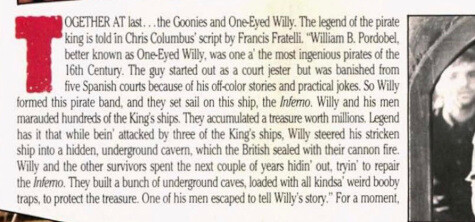To get a better handle on The Goonies’ situation, we spoke with attorney and author of Legal Guide to Buying and Selling Art and Collectibles, Armen Vartian, who pointed out that there are a number of issues at play that drastically complicate the film’s resolution. For one thing, pirate treasure, which is obviously stolen, isn’t simply up for grabs for any random children who happen to stumble upon it. If we’re talking about, say, coins that were stolen from Spanish colonies throughout the Americas, for example, “Spain would still want that.”
So anyone removing such a treasure would “still have to deal with the government of Spain saying, well, that’s our property still.” Which is a thing that has really happened in real life (no mention of booby traps or murderous families of petty crooks, though). The same goes for the gemstones because they wouldn’t be One-Eyed Willy’s to legally abandon since he never owned them to begin with.
Now, as those of you who are intimately familiar with the official Goonies Souvenir Magazine are well aware, One-Eyed Willy is a former Spanish jester who was “banished” because of his “off-color stories and practical jokes” (which perhaps explains his punchline of a name). Once he became a pirate, Willy mainly stole from the British and “mauraded hundreds of the King’s ships.”
Warner Bros.
But even if the booty came from England, the “same principles apply,” and they would likely still claim ownership of any recovered treasures that had been stolen. And they wouldn’t necessarily be the only interested party; in some states, such as Florida, the state “claims a share,” and occasionally, even insurance companies will ask for a share, asserting that they had “insured the cargo” back in the day. Although the Goonies’ ship magically drifting into international waters at the end of the movie would probably take away any state claims to the treasure, so it’s kind of surprising that none of the townspeople quickly hopped on a speedboat and filled it with doubloons.

